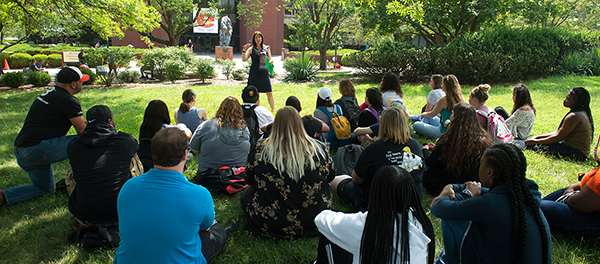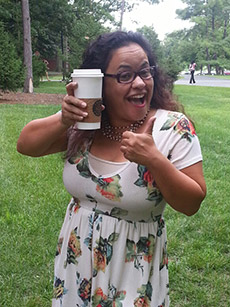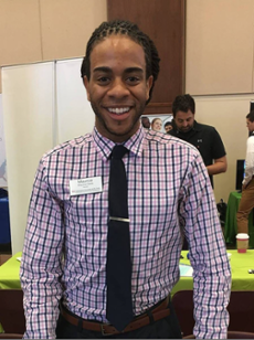Dr. Flo Maatita has been at SIUE for over a decade and is one of the most beloved teachers in the department. We are proud that she, along with Sandra Weissinger, Liz Stygar and Connie Frey Spurlock, was one of 21 University faculty nominated by students as a Phenomenal Woman.
You have developed lots of interesting classes during your time at SIUE. Which class is your favorite? Tell us more about it.
The safe answer to this question is that I have no favorites! Yes, I have developed some interesting classes: sociology of Harry Potter; sociology of immigration; social inequality; and social inequality and the body. Next fall I’ll be offering a graduate seminar on sociology of the body and an interdisciplinary course with Dr. Laura Fowler, associate professor of historical studies, on the history of social protest in spring 2019. I think I am most proud of my sociology of immigration class. I teach it every spring, and the students I have this semester are so engaged and curious. They certainly make my job easier!
This course also means a lot to me because it is a tribute to my family. My father emigrated from Indonesia (and the Netherlands) in the mid-1950s, and my mother emigrated from Mexico in 1960. I am incredibly proud of my immigrant family histories, and I want to celebrate it not just because I’m proud of those who came before me, but because we are in the midst of a historical moment where there is so much vilification and criminalization of immigrants.
In August, you presented a paper about the St. Louis Women's March. Can you sum up what you found most interesting about the research?
I presented my paper, “This is What Inclusion Looks Like: Negotiating, Managing and Presenting Race and Gender in the Women’s March on St. Louis,” at the annual meeting of the Society for the Study of Social Problems in Montreal. This paper was born out of my interest in discussions, primarily on social media, prior to the women’s marches in January 2017 where many women criticized march organizers for privileging white women’s voices and experiences. St. Louis was not unique in critics’ charges of racism, and I thought that this particular moment could have been an opportunity for a constructive dialog about intersectionality in a city that is one of the birthplaces of the Black Lives Matter movement. As a result of dialoging and negotiating, the march in St. Louis was capped off by a rally that featured 11 speakers, eight of whom were women of color. I was curious about the process of choosing speakers.
At the time of the presentation, I did not have time to interview speakers at the rally. I was, however, able to use discussions on social media, namely Facebook, and the pictures posted on various sites (e.g., St. Louis Post-Dispatch, Riverfront Times). Threads on social media revealed some constructive discourse about racism, intersectionality and white privilege. Some exchanges were not so productive as well. The images I found presented a group of marchers that were diverse in terms of gender identity, sex, race-ethnicity, age and religion.
Unfortunately, I have not been able to continue with this project, but it is on my to do list….
It’s no secret that you have a soft spot for UConn Women’s basketball team. Is there room in your heart for the SIUE women’s team?
Actually, there’s a lot of room in my heart for the SIUE women’s and men’s teams. I have had season tickets to their home games for years, and I have been a faculty mentor for both teams for the past three years. I was also on the committee to hire Coach Paula Buscher in the spring of 2012. I think she has done an outstanding job with the women’s program, and I love watching their hustle and ferocity on the court.
I cheer as loud as I can for these student-athletes on and off the court, although it is no secret that my cheering wouldn’t be as loud if SIUE ever matched up with my beloved UConn Huskies.







